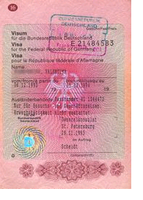Remember that these may differ from university to university. Also, make sure you write down everything you need for the registration, from original documents, authenticated translations, and insurances to the money you need for the various fees required.
The International Office of your university or FH is where you can get complete and accurate information concerning registration in your specific case and at that particular university. Usually, the following may be required: the notification of admission with your registration number, and a health insurance valid in Germany.
Administrative and social fees
Aside from the above mentioned, there will be certain administrative and social fees required, which are not tuition fees. These fees can rise up to about 100 euros, and will be used for the issuing of your student identity card, of a course record book and some registration certificates for courses, seminars, library, or registration renewal. Once you have registered and paid the necessary fees, you will be entitled to a Semesterticket which means you can use public transportation for free during the respective semester.
An important thing to remember is that usually, you have to personally show up for registration. Registration is valid one semester only, and you will have to repeat the same procedure if you wish to continue your studies the following semester(s). Failure to do this in time can mean you risk being expelled from the university. Details and dates are to be found in the university’s catalogue and at the Registrar’s Office. Make sure you mark this as very important in your calendar!
Tuition fees in Germany
Studying at most public universities in Germany is tuition free. However, you may want to keep in mind that there are talks about the introduction of tuition fees in most universities in the near future. Some federal states have already done so. The amount you would have to pay per semester is around 500 euros. If you want to know which federal states already charge tuition fees, how much, and what the plans are for the near future, go to the following website: www.studis-online.de . For comparison you can also check this website: www.internationale-studierende .
You should remember however, that these are only the tuition fees. There will be other fees and charges you have to count with. This means you have to think about this and plan your stay in Germany very carefully. Currently, at the most public universities you do not have to pay any tuition fees if you are a first time student, or if you already hold a degree such as a Bachelor’s and wish to continue your studies with a Master’s program in the same or a related field. PhD and doctoral programs are in some cases also tuition free. Please note that private universities do charge tuition fees for all types of programs.
So, when do you have to pay tuition fees at public universities? There are several situations, which are described briefly in the following:
- When you are enrolling for a second degree, continuing training programs or for postgraduate degree programs;
- when you choose some English instructed Master’s programs (And not only! Therefore, make sure you check this before with your chosen university);
- when you study longer than the standard period (this also depends on the field of study);
- and if you are an occasional student.
We are not mentioning the costs of these programs because they are subject to changes. However, they can range from some 300 to 1,500 euros per semester. You can find updates on DAAD’s website. The most reliable source, however, is the university itself. So contact the International Office of the university of your choice for advice and to find out the latest changes.
Study visas for Germany
Another very important thing you need for your study and stay in Germany is the visa. If you are a citizen of a European Union country, you do not need a visa, as the same conditions as for German nationals apply for you. There are a few other countries for which a visa is also not required, these countries are: Andorra, Australia, Canada, Honduras, Iceland, Israel, Japan, Liechtenstein, Monaco, New Zealand, Norway, San Marino, South Korea, Switzerland and the United States of America. If you come from a different country you will need to apply for a visa.

So, how does this work? Since there are different conditions and requirements depending on your country of origin, the best way to find out accurate and updated information is to visit the websites of or call the German embassy or consulates in your country. They will be able to advise you and explain the procedure to you. Usually, you apply for the visa after you have received your confirmation of admission at a German Studienkolleg, university or FH. You also have to present proof that you have sufficient financial means at your disposal for your cost of living in Germany.
Make sure you apply for your student visa well in advance, as the processing of your application may take up to some weeks. Remember you should be able to personally be in Germany and register at your university before the beginning of the semester, and a different type of visa, e.g. a tourist visa will not be accepted. You also have the possibility to first apply for a visa and then look for and apply for a program. You should remember, however, that such a visa will only be valid for three months, and it will only serve you for the purpose for which it was issued.
Also, remember that even if you have received the confirmation of admission from your university, this will not always guarantee that you will get your visa. For reasons that these diplomatic representations have the right not to disclose, they may decide not to grant you a visa. If you do get your visa, you should bear in mind that you have only received a visa for study purposes. This means there are strict conditions attached to it, and it can only be used for the specified purposes. Carefully inform yourself what these purposes and conditions are, and remember that doing otherwise means breaking the laws, which can lead to your expulsion from Germany.
Upon arrival in Germany, you should present yourself to the foreigners’ office ( Ausländerbehörde) to convert your study visa into a residence permit. This does not mean a change in purpose, i.e. it does not mean you have the right to work, but it means you have the right to live and study in Germany. Of course, all students would like to be able to work part time to earn some much needed extra money.
Tip: When you go to register with German authorities, and if you do not speak German, you will find it quite difficult, as not all civil servants speak (or want to speak!) English or another language. Since on such an occasion you may need to understand and use specific words and fill out the registration forms in German, it is best to go together with a German friend or colleague who could help you with this. If you do not know anyone, ask for help at the Student Union ( Studentenwerk) of your university. This procedure also differs depending on your country of origin, so you will need to ask specific questions about what exactly you need to do and what kind of documents you need to provide. Also students who do not require a visa must register with authorities in this way.
This article is an extract from Study in Germany - A comprehensive guide for foreign students. Click here to get a copy now.




